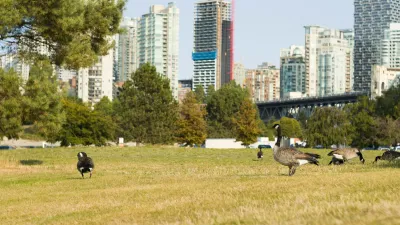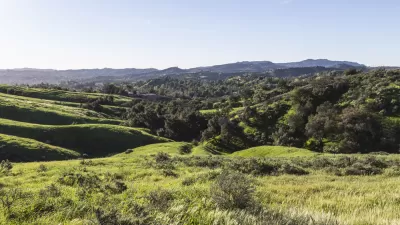Two competing initiatives seek to change city regulations for residential and commercial development on the city's parklands and open spaces.

Two measures aiming for this November's ballot will ask Denver residents to vote for or against development on protected green space. "One measure would prohibit commercial and housing construction without voter approval on any parks and city-owned land protected by a conservation easement, including the 155-acre former Park Hill Golf Course, where development has been blocked since 1997," reports Bruce Finley in the Denver Post. "A counter-measure that also has cleared initial review, put forward by the Westside Investment Partners developers who own the Park Hill land, would change the definition of “conservation easement” to make an exception for this property — and could apply to other protected open space."
Currently, "[s]tate law governs conservation easements and lifting restrictions requires a state court order. A state judge first must determine conservation is impossible." Despite this, officials are exploring the potential for a mixed-use development at Park Hill. Despite growing voter support for ballot measures that demand open space in and around Denver, "green space hasn’t kept pace with population growth and development. About 8% of Denver is designated as parks, compared with 20% and greater in other large U.S. cities." Park Hill, financed by a $2 million easement voted on by taxpayers in 1997, is the city's largest open space and a much-needed parkland in northeast Denver, "an area that city maps identify as relatively deficient in park space and where heat islands amplify temperatures."

Maui's Vacation Rental Debate Turns Ugly
Verbal attacks, misinformation campaigns and fistfights plague a high-stakes debate to convert thousands of vacation rentals into long-term housing.

Planetizen Federal Action Tracker
A weekly monitor of how Trump’s orders and actions are impacting planners and planning in America.

San Francisco Suspends Traffic Calming Amidst Record Deaths
Citing “a challenging fiscal landscape,” the city will cease the program on the heels of 42 traffic deaths, including 24 pedestrians.

Adaptive Reuse Will Create Housing in a Suburban Texas Strip Mall
A developer is reimagining a strip mall property as a mixed-use complex with housing and retail.

Study: Anti-Homelessness Laws Don’t Work
Research shows that punitive measures that criminalized unhoused people don’t help reduce homelessness.

In U.S., Urban Gondolas Face Uphill Battle
Cities in Latin America and Europe have embraced aerial transitways — AKA gondolas — as sustainable, convenient urban transport, especially in tricky geographies. American cities have yet to catch up.
Urban Design for Planners 1: Software Tools
This six-course series explores essential urban design concepts using open source software and equips planners with the tools they need to participate fully in the urban design process.
Planning for Universal Design
Learn the tools for implementing Universal Design in planning regulations.
Heyer Gruel & Associates PA
JM Goldson LLC
Custer County Colorado
City of Camden Redevelopment Agency
City of Astoria
Transportation Research & Education Center (TREC) at Portland State University
Jefferson Parish Government
Camden Redevelopment Agency
City of Claremont





























